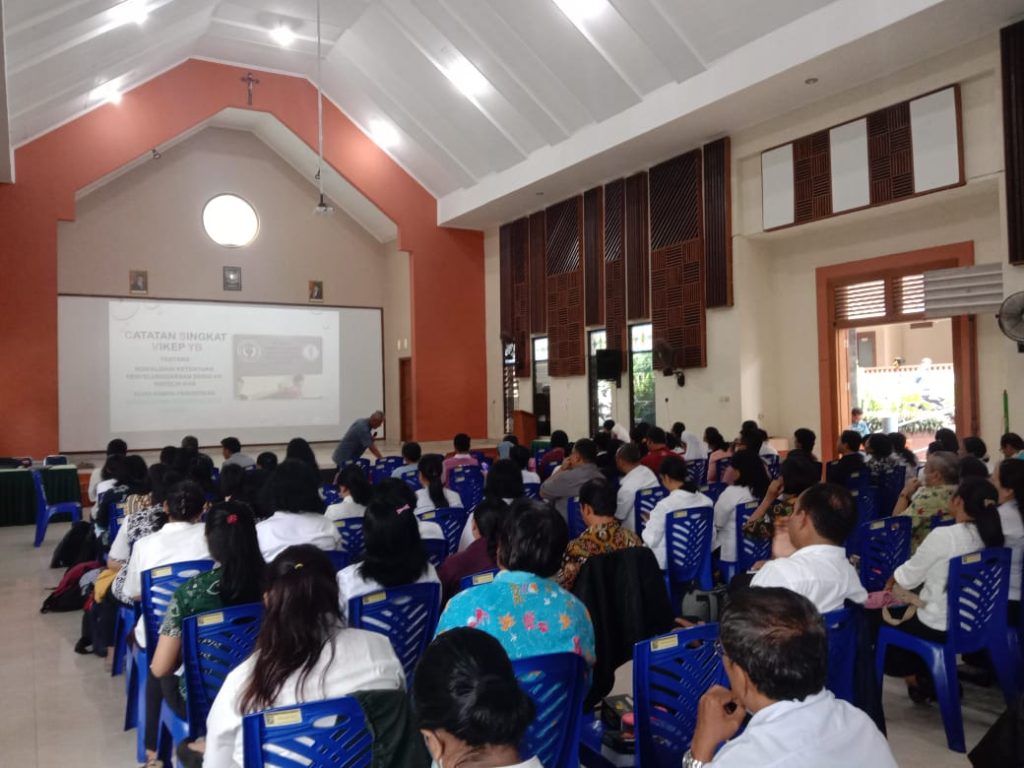Catholic educators in West Yogyakarta gathered on May 21 to align on synod outcomes and new education guidelines shaping Archdiocese of Semarang schools.
Held at the St. Theresia Parish Hall in Sedayu, the meeting brought together principals, teachers, foundation representatives, parish priests, and education ministry personnel for the Presentation of Synod Results and Socialization of School Education Guidelines, organized by the Education Commission of the West Yogyakarta Vicariate.
The program opened with the national anthem Indonesia Raya and the March of the Archdiocese of Semarang, followed by a prayer led by FX Iwan Setiyo Aji of SMP Pangudi Luhur Sedayu.
In his welcome, Fr. Antonius Koko Kristanto, Pr., parochial vicar of Sedayu Parish, described the forum as “a very good activity and a form of appreciation as a step forward, courageous in action even though not yet perfect.”
Fr. Yoseph Nugroho Tri Sumartono, Pr., chair of the Education Commission, introduced the day’s agenda, which centered on two key presentations and an open forum.
Fr. Bernadus Singgih Guritno of the Pastoral Education Development Unit (UPPP) delivered the synod report, saying that “the educational synod conducted by KAS has made significant contributions to the sustainability of education within the archdiocese,” and that all parties involved “can now better understand the current state of Catholic education.”
He highlighted the synod’s key recommendations, which include improving the quality of education and human resource management, maximizing opportunities, strengthening Catholic identity and connection with the faithful, encouraging technological integration and innovation, and promoting standardization.
The next session featured Fr. Yuvensius Deny Sulistyawan, also from UPPP, who presented the Guidelines for Catholic School Education in the Archdiocese of Semarang.
He underscored the need for alignment between school foundations and the archdiocese, saying, “The management, regulations, and policies of Catholic schools must align between the foundations and the diocese.”
He noted that these guidelines are accessible and should be referenced in managing Catholic education.
Participants engaged the speakers in a lively discussion following the presentations, sharing experiences and clarifying issues related to the implementation of the guidelines.
Fr. AR Yudono Suwondo, Pr., vicar of West Yogyakarta, delivered a pastoral reflection to conclude the core sessions. “Education is apostolate (GE 3–5), a calling that is more than teaching—it is proclaiming the Gospel, building community, and a form of lay apostolate,” he said.
He called for heightened awareness and shared responsibility among the Church community. “As a community in education, we need a sense of crisis from the faithful and priests concerning Catholic education. Pray for the grace of concern,” he urged. “
Be brave to enter deep reflection—discretio—to build an imaginative school community. Always return to our core spirit: spirituality—Catholic identity, LEKAS (Excellence Institutions of KAS), toward collaboration, synergy, synodality, a joyful Church (ARDAS 2026–2030).”
In his final remarks, Fr. Nugroho promoted the Two-Thousand Rupiah Movement (GERDU), encouraging broader parish and community support to sustain Catholic education efforts. The session ended with a prayer led by Sr. Kalista, PIJ.
Organizers expressed hope that the gathering would renew the sense of mission and commitment across all Catholic school units in the region.







